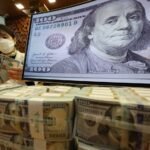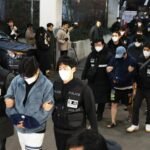
BEIJING – China has imposed sweeping sanctions on five US subsidiaries of South Korea’s Hanwha Ocean Co., accusing the shipbuilder of aiding Washington’s efforts to revive its shipbuilding industry – a move that underscores how Korea is becoming caught in the escalating US–China confrontation.
The Chinese Ministry of Commerce said on Tuesday that it will prohibit “all forms of trade, exchange and cooperation” between Chinese individuals or firms and Hanwha Ocean’s five units in the US.
The five firms are Hanwha Shipping LLC, Hanwha Philly Shipyard Inc., Hanwha Ocean USA International LLC, Hanwha Shipping Holdings LLC and HS USA Holdings Corp.
The announcement marks the first time Beijing has directly targeted a Korean company under the current China-US trade dispute.

The ministry’s Bureau of Security and Import–Export Control cited Hanwha’s alleged cooperation with a US government investigation under Section 301 of the US Trade Act, which has been used to justify tariffs and restrictions on Chinese shipping and logistics operations.
Beginning at midnight, Washington has levied a $50-per-ton port fee on Chinese vessels, a retaliatory measure Beijing has matched by imposing identical fees on US-owned ships.
Hanwha Ocean, blindsided by the sanctions, said the affected entities are largely dormant or newly established and have had “no role in any (US) government investigation.”
Hanwha Philly Shipyard also denied involvement in the 301 probe.

WARNING SHOT AHEAD OF XI-TRUMP MEETING
Industry watchers said Beijing’s move may be a warning shot ahead of a possible summit between Chinese President Xi Jinping and US counterpart Donald Trump in Korea later this month.
The two leaders will fly to Seoul later this month in time for the Asia-Pacific Economic Cooperation (APEC) summit in the historic city of Gyeongju Oct. 31–Nov. 1.
They are widely expected to meet at the Gyeongju APEC, marking their first encounter in more than six years and the most significant geopolitical moment yet of Trump’s second term as president.

“This (the sanctions) is a message to Korean companies that cooperate too closely with a US government hostile to China,” said Chung Yeon-seung, a business professor at Dankook University. “Beijing wants to show that support for Washington’s strategic initiatives comes with costs.”
RIPPLE EFFECTS
The Chinese move has sent ripples through Korea’s shipbuilding sector, long seen as a pillar of high-value manufacturing and a key partner for both US naval programs and global trade.

Hanwha Ocean, formerly Daewoo Shipbuilding & Marine Engineering, has been leading the “Make American Shipbuilding Great Again” (MASGA) project – a Korea-proposed initiative to revive the US shipbuilding industry with minimal labor input through automation and AI.
The Chinese decision also raises fears that China’s retaliatory measures could extend to other sectors where Korean firms have deep exposure to both markets.
“If the pattern broadens, semiconductors, steel, and even AI technology could be next,” Chung said.
Executives at HD Hyundai Heavy Industries Co., another key player in the MASGA project, are said to be monitoring developments closely.

Although the company has not cooperated with US investigations, it has expanded partnerships with US defense contractor Huntington Ingalls Industries and offshore energy firm Edison Chouest Offshore.
For Seoul, Beijing’s action represents a test case of economic coercion in a new era of multipolar trade rivalry – one where Korean business groups may find it increasingly difficult to balance between their two largest markets, analysts said.
By Eun-Jung Kim, Woo-Sub Kim and Si-Ook Ahn
kej@hankyung.com
In-Soo Nam edited this article.















